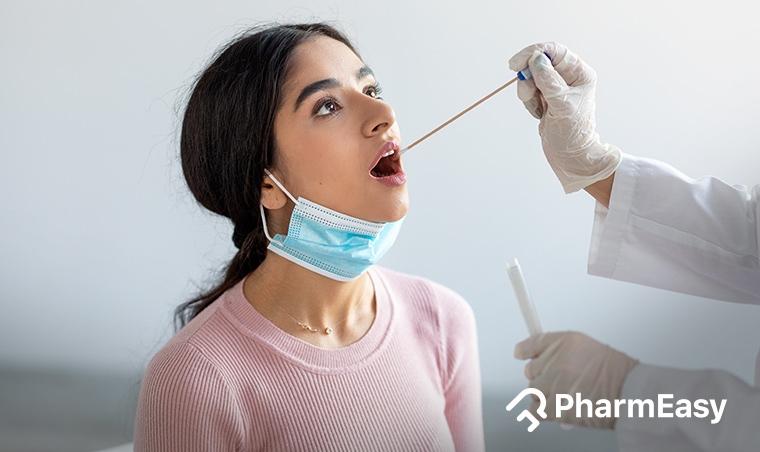If I Have COVID for the Second Time, Does It Mean It Will Be Less Severe?
By Dr. Nikita Toshi +2 more

Get,

to manage your symptom
Get your,


4 Cr+ families
benefitted

OTP sent to 9988776655



You’ve successfully subscribed to receive
doctor-approved tips on
Whatsapp

Get ready to feel your best.

Hi There,
Download the PharmEasy App now!!


Register to Avail the Offer
Send OTPBy continuing, you agree with our Privacy Policy and Terms and Conditions

Hi There,
Sign up on PharmEasy now!!
Trusted by 4 crore+ families

OTP sent to 9988776655



You have unlocked 25% off on medicines




Code: NU25
By Dr. Nikita Toshi +2 more
A re-infection means getting infected with a disease that you already suffered from once. Reinfection with the COVID-19 virus means a person was previously infected, recovered and got infected again. While it is true that most individuals who recover from COVID-19 will have some protection, reinfections do occur. The reported cases of a re-infection are fewer.

Table of Contents
Our immune system plays the role of remembering certain infections and recognizes them the moment they enter our body. It fights the infection and protects you. However, it tends to forget some of the infections, especially the ones that have changed their form, mutated and appeared as a new variant. The antibodies produced in our body previously may not be as responsive the next time. It is possible to get an infection with the same strain again and your body’s immunity will likely be highly responsive and try to limit the spread of the infection. It can prevent you from getting a severe illness or having complications depending on other pre-existing medical conditions of a person. It is important to understand that anyone can get reinfection with COVID.
In my opinion, like in dengue always reinfection will have severe symptoms due to accelerated immune response.
Dr. M.G. Kartheeka, MBBS, MD(Pediatrics)
Reinfection is something that cannot be ignored in COVID, irrespective of the variant. This is why it is crucial to not take any risks and continue to follow COVID guidelines. Since we cannot say for sure what’s in store for us in the future, it only makes sense to continue following COVID appropriate behaviour even after a recent COVID recovery. It is advised to maintain physical distancing, proper masking, and sanitize frequently in order to avoid possible reinfection from any variant.
Did you know?
Individuals may be at a higher risk of having COVID-19 re-infection due to several factors that may increase their risk of exposure to the virus. One must continue to take preventive measures after being fully vaccinated and even after getting infected with COVID-19 once. Weak immunity can be a major risk factor of COVID-19 re-infection. People who are undergoing chemotherapy, organ transplant or autoimmune disorders are at greater risk of COVID-19 reinfection.
Getting covid for the second or third time might pose a higher health risk especially in immunocompromised, elderly, pregnant females and children.
Dr. Ashish Bajaj, M.B.B.S., M.D. in Clinical Pharmacology and Toxicology
With the onset of Omicron, experts say COVID symptoms are now milder in the majority of the cases. Most people who are re-infected with COVID may only experience cold-like symptoms such as a sore throat, runny nose, body ache and mild fever which lasts for 3 days. In certain cases of COVID-19 reinfection, people have reported gastrointestinal symptoms such as nausea, vomiting and loss of appetite. Only a small number have reported serious illness due to re-infection.
The way in which fully vaccinated individuals are more protected against severe COVID-19 infections than unvaccinated people, similarly, people who have had COVID-19 once are thought to experience milder symptoms of COVID re-infection. The re-infected person has some pre-existing immunity from their primary infection. Experts say the severity and symptoms depend on the variants one is affected with.
You may think that if vaccines are unable to prevent a re-infection, they are not effective enough. However, the truthis vaccination can bring down the rate of mortality, prevent the severity of COVID-19 re-infection, control the rate of transmission and reduce the need for hospitalization.
After getting vaccinated, your body may take a few days or up to two weeks to build immunity against the virus. It is possible that you may contract the virus immediately after getting your shot. This is why even if you are fully vaccinated, you must continue to follow the guidelines and COVID-19 appropriate behaviour sincerely.
Scientists say that immunity wanes over a certain period of time, which is why booster doses of vaccines are important. It re-exposes the body’s immune system to the virus and triggers an immune response. As we continue to learn more about COVID-19 re-infection, we must understand the importance of vaccination and abide by COVID guidelines.
Disclaimer: The information provided here is for educational/awareness purposes only and is not intended to be a substitute for medical treatment by a healthcare professional and should not be relied upon to diagnose or treat any medical condition. The reader should consult a registered medical practitioner to determine the appropriateness of the information and before consuming any medication. PharmEasy does not provide any guarantee or warranty (express or implied) regarding the accuracy, adequacy, completeness, legality, reliability or usefulness of the information; and disclaims any liability arising thereof.
Links and product recommendations in the information provided here are advertisements of third-party products available on the website. PharmEasy does not make any representation on the accuracy or suitability of such products/services. Advertisements do not influence the editorial decisions or content. The information in this blog is subject to change without notice. The authors and administrators reserve the right to modify, add, or remove content without notification. It is your responsibility to review this disclaimer regularly for any changes.

Leave your comment...
Comments